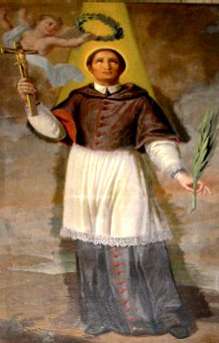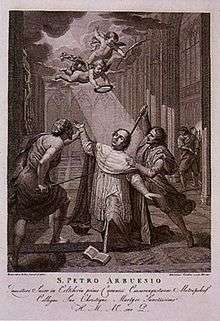Pedro de Arbués
| St. Pedro de Arbués | |
|---|---|
 Depiction of Pedro de Arbués with the crown and palm of martyrdom. | |
| Religious, priest and martyr | |
| Born |
ca. 1441 Épila, Kingdom of Aragon |
| Died |
September 17, 1485[1] Zaragoza, Kingdom of Aragon |
| Venerated in |
Roman Catholic Church (Canons regular and the Roman Catholic Archdiocese of Zaragoza) |
| Canonized | 1867, Rome, Papal States, by Pope Pius IX |
| Major shrine |
Cathedral of the Savior, Zaragoza, Spain |
Pedro de Arbués, C.R.S.A. (c. 1441 – September 17, 1485), was an official of the Spanish Inquisition who was assassinated in the La Seo Cathedral of Zaragoza in 1485 in an alleged plot by conversos and Jews. He was very quickly venerated as a saint by popular acclaim, and his death greatly assisted the Inquisition and its Inquisitor General, Tomás de Torquemada, in their campaign against heresy and crypto-Judaism.
Arbués was canonized in 1867.
Life
Born at Épila, in the region of Zaragoza, his father, a nobleman, was Antonio de Arbués, and his mother's name was Sancia Ruiz. He studied philosophy, probably at Huesca, but later went to Bologna on scholarship to the Spanish college of St. Clement, part of the University of Bologna. He obtained his doctorate in 1473, while serving as professor of moral philosophy. Returning to Spain he became a member of the cathedral chapter of canons regular at La Seo, where he made his religious profession in 1474. [2]
About that time Ferdinand and Isabella had obtained from Pope Sixtus IV a papal bull to establish in their kingdom a tribunal for searching out heretics. Jews who received baptism were known as Conversos; some may have continued to practice Judaism in secret. Torquemada, in 1483, was appointed Grand Inquisitor for Castile and appointed Arbués and fray Pedro Gaspar Juglar as Inquisitor Provincial in the Kingdom of Aragon (1484).[2]
The Tribunal of the Holy Office was received in the kingdom with opposition, not only from the converts, but from other sectors of the Aragonese population, who saw it as a threat to their freedoms.[3]
On September 14, 1485, Arbués was attacked while praying in the cathedral. On September 17, he died despite having been wearing a helmet and chain mail. The Inquisition was poorly received in Aragon, where it was seen as an attack by the Crown on the charters, privileges and local laws. It seems that some of the most powerful families among the converted Jews - such as the Sánchez, Montesa, Paterno, and Santangel families - were involved in the murder. Two days later he died of his wounds.
As a result, a popular movement against the Jews arose; "Nine were finally executed in person, and two suicides, thirteen burnings in effigy, and four punished for complicity," according to the historian, Jerónimo Zurita.
Veneration

Honored as a martyr, Arbués' remains were entombed in a special chapel dedicated to his memory. His canonization by Pope Pius IX in 1867 aroused protests not only from Jews, but from Christians.[4]
Pius IX said in the canonization document, "The divine wisdom has arranged that in these sad days, when Jews help the enemies of the church with their books and money, this decree of sanctity has been brought to fulfillment."[5]
Leonardo Sciascia in Morte dell'inquisitore (1964) writes that Arbués, along with Juan Lopez Cisneros (d. 1657), are "the only two cases of inquisitors who died assassinated".
See also
Notes
- ↑ "Arbués, Pedro de", Gran Enciclopedia Aragonesa
- 1 2 Allaria, Anthony. "St. Peter of Arbues." The Catholic Encyclopedia Vol. 11. New York: Robert Appleton Company, 1911. 2 May 2015
- ↑ "Arbués, Pedro de", Gran Enciclopedia Aragonesa, October 21, 2009
- ↑ "Arbues, Pedro", Jewish Encyclopedia
- ↑ Garry Wills, "The Popes Against the Jews: Before the Holocaust," New York Times, September 23, 2001. Retrieved from http://online.sfsu.edu/~rone/Religion/popesagainstjews.html.
References
- Simon Whitechapel, Flesh Inferno: Atrocities of Torquemada and the Spanish Inquisition (Creation Books, 2003). ISBN 1-84068-105-5
 This article incorporates text from a publication now in the public domain: A. Allaria (1913). "St. Peter of Arbues". In Herbermann, Charles. Catholic Encyclopedia. New York: Robert Appleton.
This article incorporates text from a publication now in the public domain: A. Allaria (1913). "St. Peter of Arbues". In Herbermann, Charles. Catholic Encyclopedia. New York: Robert Appleton.- Pedro Arbues in the public domain Jewish Encyclopedia, Funk and Wagnalls, 1901 - 1906.
External links
| Wikimedia Commons has media related to Pedro Arbués. |
-
 "Arbués, Pedro". New International Encyclopedia. 1905.
"Arbués, Pedro". New International Encyclopedia. 1905.